Chickens are amazing animals. Hens are extremely social creatures who have complex relationships with their flockmates and take excellent care of their chicks. Hens also love taking dust baths, perching, and foraging for food by scratching in the dirt, or pecking through the grass. They’re also highly intelligent, and can communicate with over 30 different calls!
Unfortunately, the cruel egg industry disregards the incredible abilities of these animals, and makes their lives short and brutal. Male chicks who are hatched by the industry cannot lay eggs, so they are typically ground up alive by industrial macerators, or suffocated in plastic garbage bags. Meanwhile, hens are selectively bred to lay as many eggs as possible, and are usually kept in stacked wire cages, which are so small that the hens are unable to spread their wings or move around. This lack of space can lead to frustration, self-mutilation, and poor health outcomes, including premature death. And when the hens’ egg-laying productivity declines, they are sent to slaughter and turned into chicken nuggets or pet food.
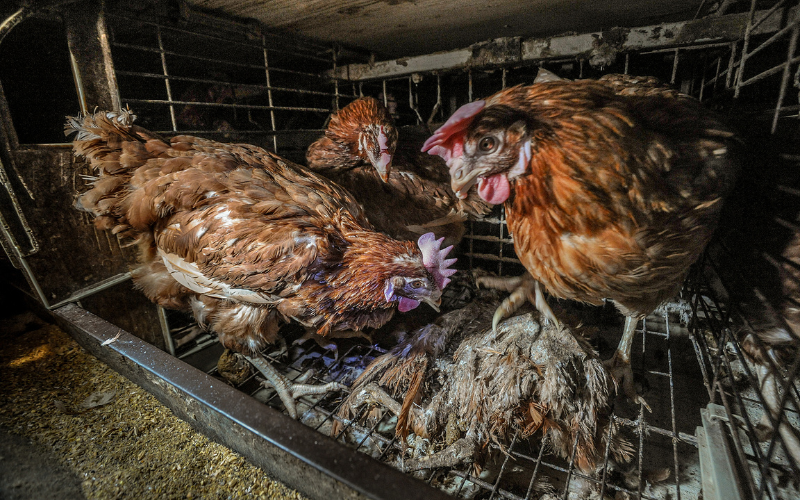
Photo: Jo-Anne McArthur | Animal Equality | We Animals Media
The egg industry isn’t just harmful to animals; it pollutes the planet, too. Every egg consumed produces slightly less than half a pound of greenhouse gases, contributing to climate change. Large amounts of pesticides are also used on the grain fed to hens, which can pollute the local air and freshwater sources. Our health can also be affected by the consumption of eggs: Salmonella, a dangerous pathogen that can induce sickness, can be found in them.
Thankfully, most shoppers now have access to tasty and nutritious alternatives to eggs, which are widely available in grocery stores and restaurants. It’s never been easier to skip eggs and avoid the cruelty of the egg industry. Let’s look at a few options!
Meal Alternatives
If you’re looking to make a delicious breakfast but want to do it egg-free, we’ve got you covered:
- Tofu scramble is a great alternative to scrambled eggs. It only takes a few ingredients, and you probably have most of them in your home! See this recipe to try it yourself.
- Chickpea omelettes are another tasty, protein-packed breakfast option. They’re quick, and very customizable. Check out a chickpea omelette recipe here.
- JUST Egg is a packaged egg alternative that can be used in a multitude of recipes. Made of mung beans, it is high in protein and tastes very similar to eggs. Click here to see what you can make with JUST Egg, and here to find it in a store near you.
- There are many more breakfast options available using egg alternatives. Find some here!
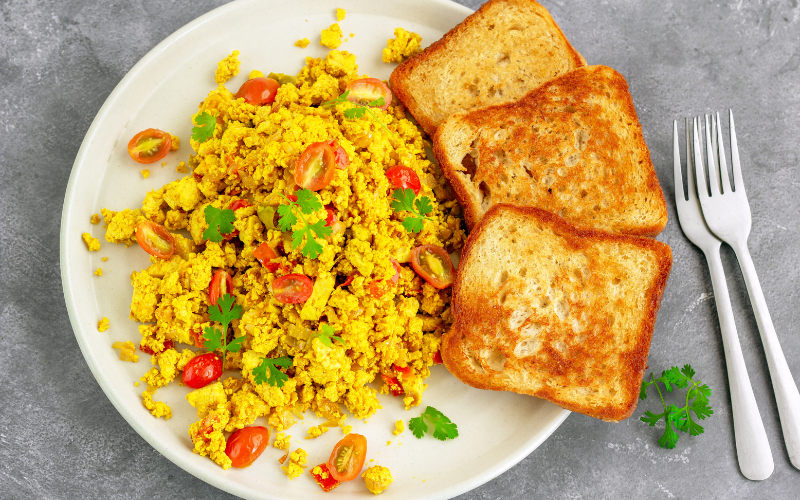

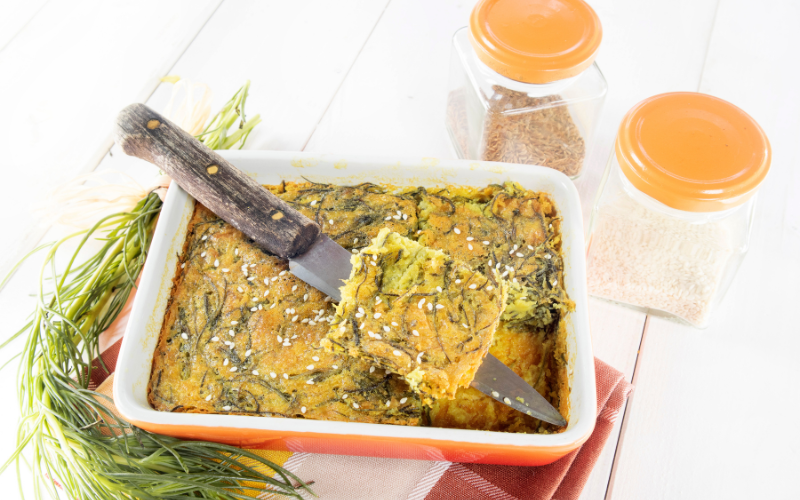

Baking Alternatives
Many recipes for baked goods list eggs as an ingredient. Fortunately, there are many cruelty-free egg substitutes available—some of which you probably already have on hand!
- Bananas can replace eggs in most dessert recipes due to their similar binding abilities. A quarter cup of mashed banana is equivalent to one large egg.
- Same goes for applesauce—a quarter cup of unsweetened applesauce is equivalent to one large egg.
- Chia seeds and flax seeds are not only a delicious replacement for chicken eggs; they are very nutritious as well. Before using them in your baked goods, you should ground them up, and hydrate them in water. One tablespoon of chia or flax plus three tablespoons of water is equivalent to one large egg.
- Powdered egg replacer is an ideal substitute for eggs and can help maintain the texture of your favourite baked goods. One and one half teaspoons of powdered egg replacer mixed with three tablespoons of water is equivalent to one large egg.
- Aquafaba is the liquid in canned beans, especially chickpeas. Its properties are similar to those of eggs, and it’s also very high in nutrients. Three tablespoons of aquafaba is equivalent to one large egg. As a bonus, aquafaba can also be whipped in a manner similar to egg whites. Learn all about aquafaba here.
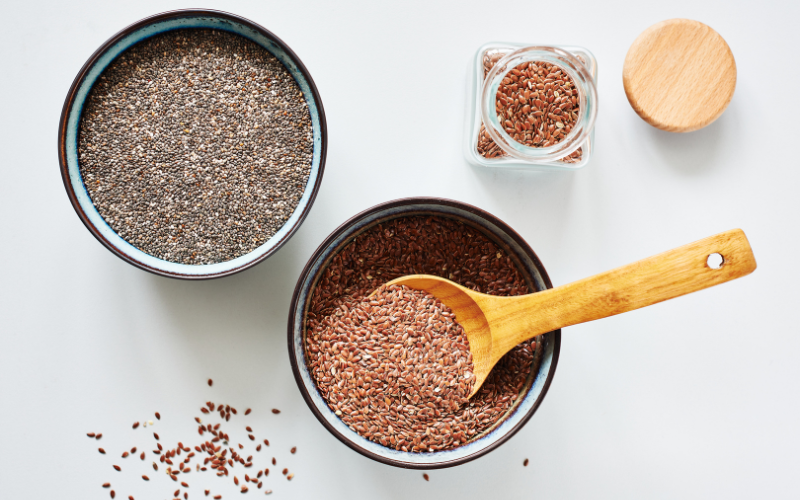

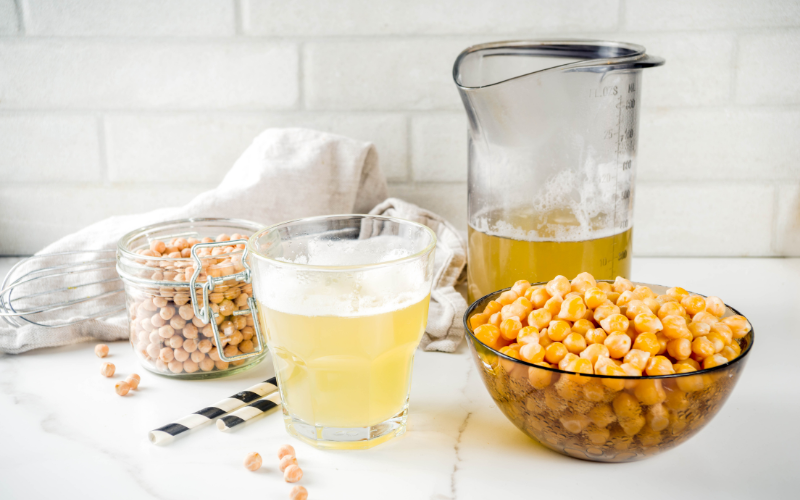

Eggspect Better
The egg industry is bad news for animals, the environment, and our health. Luckily, eggs can now be replaced with a cruelty-free option in virtually any recipe. By choosing egg-free alternatives when we’re cooking or baking, we can help create a kinder world for all beings.
At Animal Justice, we believe working on corporate change has the potential to make a meaningful, long-lasting impact for hundreds of thousands of animals. Convincing stores, restaurants, and hotels to change policies can end factory farm cruelty and protect millions of animals. Join the Animal Justice Action Team to hold corporations accountable and stop animal suffering in supply chains.
Banner: Andrew Skowron | We Animals Media
